
BEACHES

RESTAURANTS

ACCOMMODATION

NIGHTLIFE

ATTRACTIONS

NATURE
Things To Do In Split, Croatia
Planning your next holidays and considering Split as your destination? Well, let us give you some reasons why this might be an excellent idea!
Split is not only the capital of Dalmatia, a significant economic center, an important university town, and the gateway to the most beautiful islands in the Adriatic Sea, it is the city that people from all over the world chose to love and to live in. The “Sleeping Beauty” that is awakening after being captured for so long in the role of a place where people only stopped to catch the ferry to their island escapes is transforming into a destination that lures more and more visitors with its diversity in historical, cultural, gastronomic and natural attractions.
Whether you spend only hours or days here, there are plenty of things to do in Split.
Major Split attractions one should not miss are given in this Top-List!
Best things to do in Split!
#1
Visit the National Parks Near Split
Located in the very heart of the Dalmatian coast, Split is surrounded by the most stunning national parks in Croatia. The most famous is the Plitvice National park with its UNESCO world heritage status. It’s a must-see location for anyone spending time in Split or Croatia in general.
Other locations include the Krka waterfalls national park, a collection of seven waterfalls near Split Croatia all being along the Krka river. Mljet and Kornati, both island national parks are accessible by boat from Split. You can read more about the national parks near Split, as well as the nearby nature parks and the park forest Marjan in our article about national parks near Split!
#2
Visit the Islands Around Split
Split might be the #1 island hopping destination in Croatia. The city is extremely well connected with with the neighboring island with public ferries and catamarans, as well as through private boat trips and tours. The largest and best connected islands are Brac, Solta, Hvar, Vis, Lastovo and Korcula. If you want to learn more about Split islands, including some hidden gems with beautiful, private beaches, visit our article on Split islands!
#3
Taste the Mediterranean Gastronomy

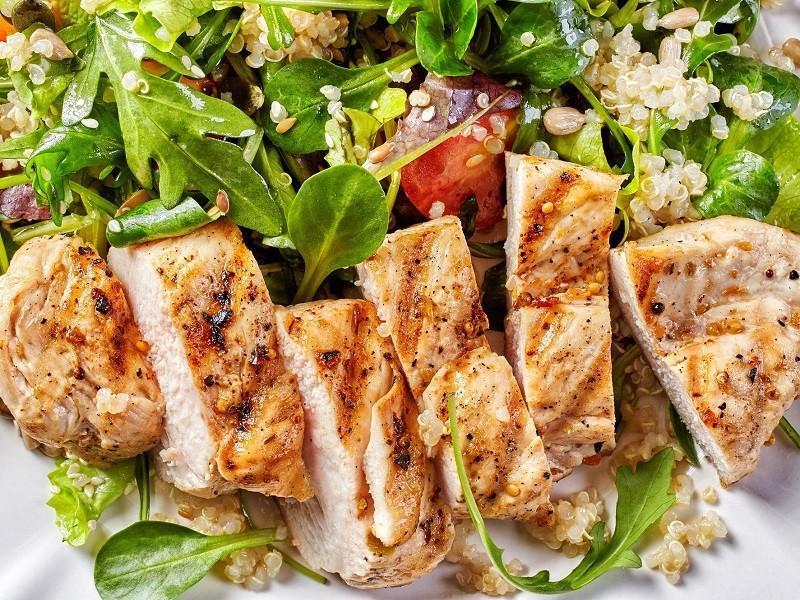
Certainly one of the reasons to visit Split and one of Split attractions is the gastronomical variety of the city’s restaurants, taverns, burger bars and wine & cheese bars. Typical Mediterranean dishes prepared of fresh fish and seafood, local vegetables and a generous drop of domestic olive oil are inevitable ingredients of traditional dishes. However, in past years more and more places opened their doors and kitchens to those in search for fusion dishes, where the blend of traditional Dalmatian meets international cuisine. Whether you decide to try some traditional Croatian food or international, don’t forget that a glass of excellent vine is always recommended to complete a wonderful dinner!
No matter if you are on a low or high budget, Split offers a great meal for every pocket. If you’re looking for recommendations, you can browse through our list of best Split restaurants!
#4
Swim at one of the Beaches in Split

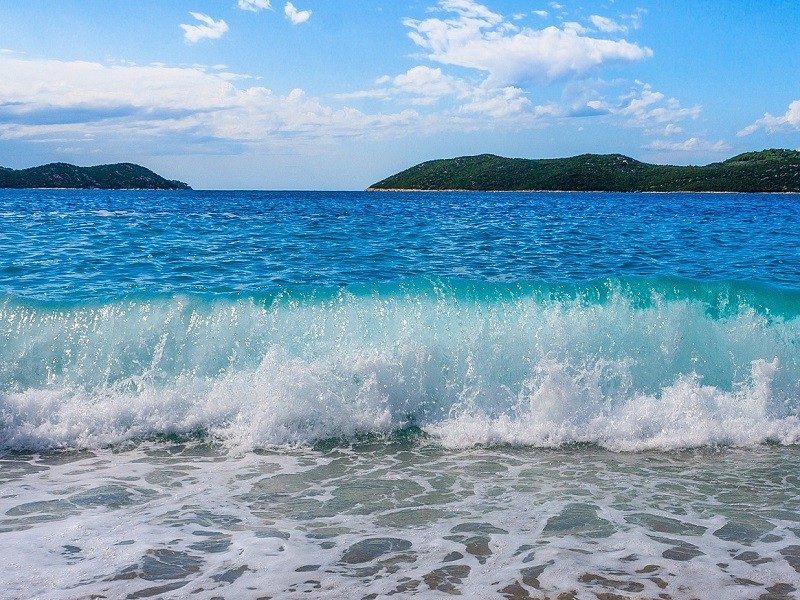
The beaches in and around Split are surely another topic to put on the list of Split attractions. Visitors usually do not have great expectations when it comes to city beaches, but they are surprised once they see the variety of beaches and the cleanliness of the sea in a city the size of Split. Several beaches within the city border have been awarded with the Blue Flag, the symbol for excellent bathing water quality, safety and an increased environmental consciousness.
On a hot summer day, one can choose to refresh at a sandy or pebble beach, to jump from rocks and cliffs that line the southern side of Marjan hill, to celebrate personal liberty by stripping off all clothes at Kašjuni beach or to lie under the shade of the dense pine forest on Marjan’s northern shore. Looking at our list of best Split beaches you can see that they are diverse, unique and a day at the beach is definitely a thing to do while you’re here.
#5
Take Part in Split Nightlife

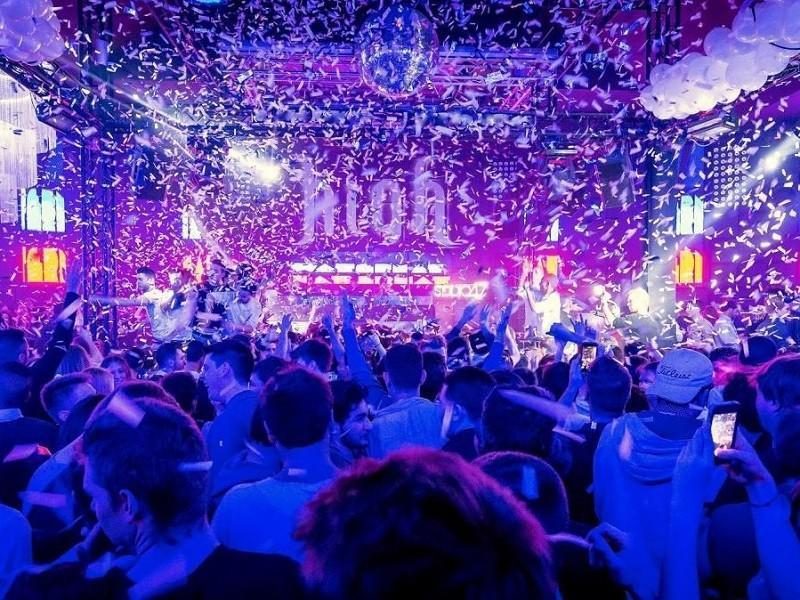
Urban nightlife in Split is unrivaled by any city along the Dalmatian coast. If you’re into clubbing or intimate wine bars, Split has it all. The city is urban enough to accommodate people looking for a city that doesn’t sleep as well as those looking for an authentic experience of the city’s culture. Read more about nightclubs, bars, pubs, wine bars and casinos in our guide to Split nightlife!
#6
Visit one of the Neighboring Towns

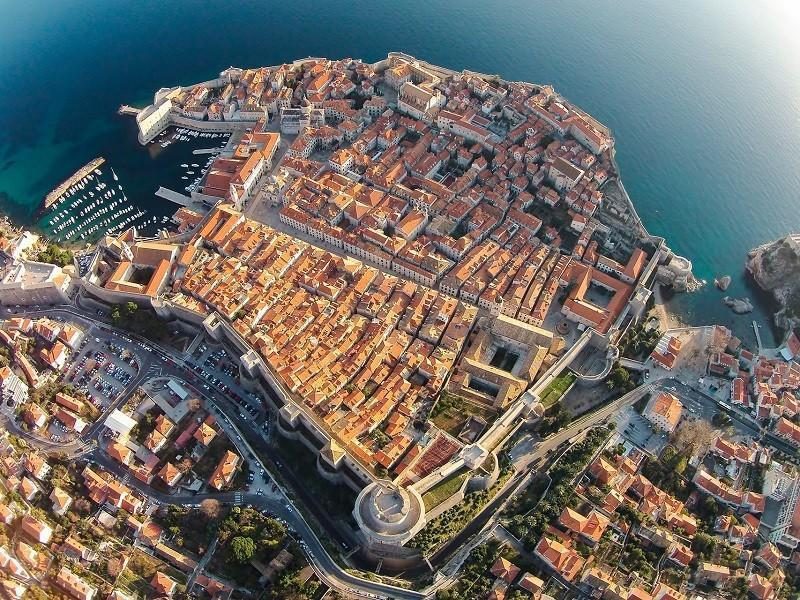
The central position Split has on the Croatian coast makes it an important traffic hub, well connected with the surrounding cities along the coast. Split is the perfect city for a traveler who wants to experience Dalmatia. All of the bigger cities along the coast are reachable by car: Dubrovnik, Omis, Sibenik, Zadar, Trogir; the Dalmatian national parks, the archipelago of Split islands. The possibility for exploration is virtually endless. Feel free to take a look at our list of the best places to visit from Split!
Must-see sights in Split!
#1
Take a Walking Tour of Diocletian’s Palace

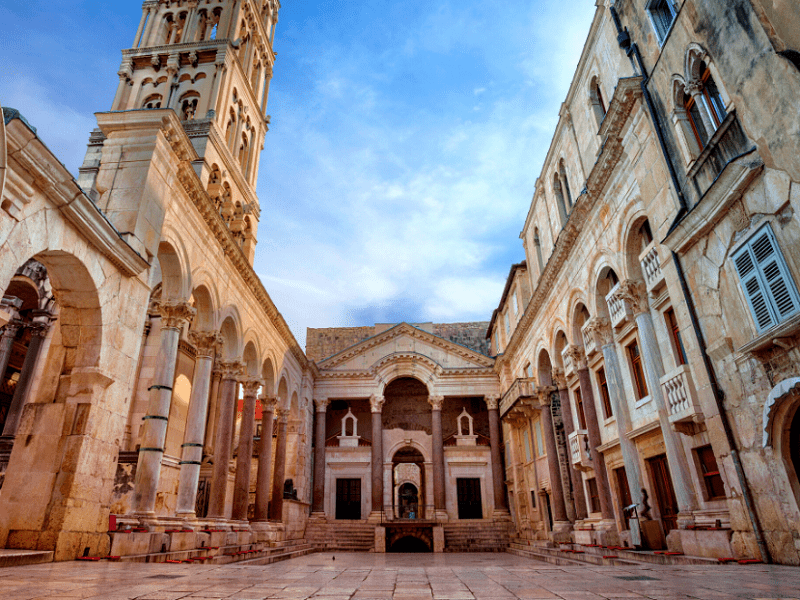
Of course it’s number one on the List of Split Attractions as it is the cradle of modern Split. It all begun here, 1700 years ago, when Roman Emperor Diocletian chose to retire and spent his last days somewhere warm, beautiful and close to his birth place Salona. He built a vast palace that is considered to be one of the most important original monuments of late ancient architecture and listed on the UNESCO World Heritage List since 1979. Over the course of history, the inhabitants expanded and transformed the palace to their needs, turning temples into churches, cellars into markets and the Emperor’s apartments into their homes. So while you are strolling through the labyrinth of small alleys, take a deeper look at the complexity and mixture of ancient architecture next to medieval Romanesque churches, Gothic and Renaissance noble houses, baroque façades, which altogether form a perfect harmony with modern and contemporary buildings.
Major sites within the palace’s walls are:
- Peristyle, the impressive central square in front of Diocletian’s private apartments and stage for one of the major cultural events in Split- the Split Summer Festival
- Saint Domnius Cathedral (originally the mausoleum of Diocletian) with its distinctive bell tower that can be climbed for magnificent views over the city and sea.
- Temple of Jupiter, which was turned into a baptistery, with an original Egyptian sphinx in front of it
- The Palace’s Four Gates (Golden Gate, Silver Gate, Bronze Gate, Brass Gate)
- Vestibule, the round court with an open cupola that led to the entrance of the imperial chambers, still impresses with its architecture and acoustics
- The Palace’s Substructure known as the Cellars- after centuries of hiding they were discovered and cleared from waste in the 19th century. Nowadays they house many souvenir stalls but also cultural and gastronomic events.
#2
Have a Cup of Coffee at Riva Seafront Promenade

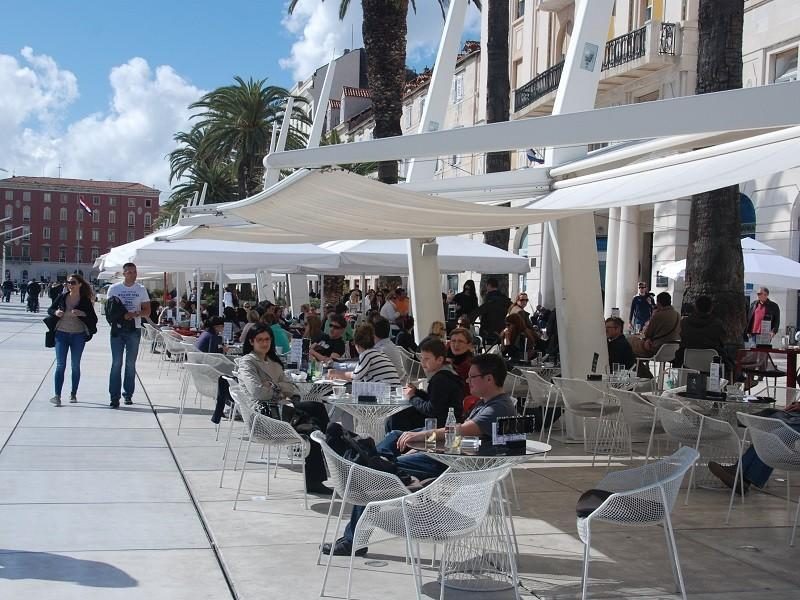
Riva is the heart and soul of the city and its people. Enjoy a coffee or cold drink during hot summer days by sitting next to the locals and learn how they define the Mediterranean lifestyle with a view over Split’s gorgeous port. It is here, under the Dalmatian sun, where people discuss life, politics, love and other affairs, where deals are made, local gossip is spread, where information emerges first. It’s a tradition and must-do while being in Split. Don’t miss it!
#3
Explore The Imortant Squares in Split

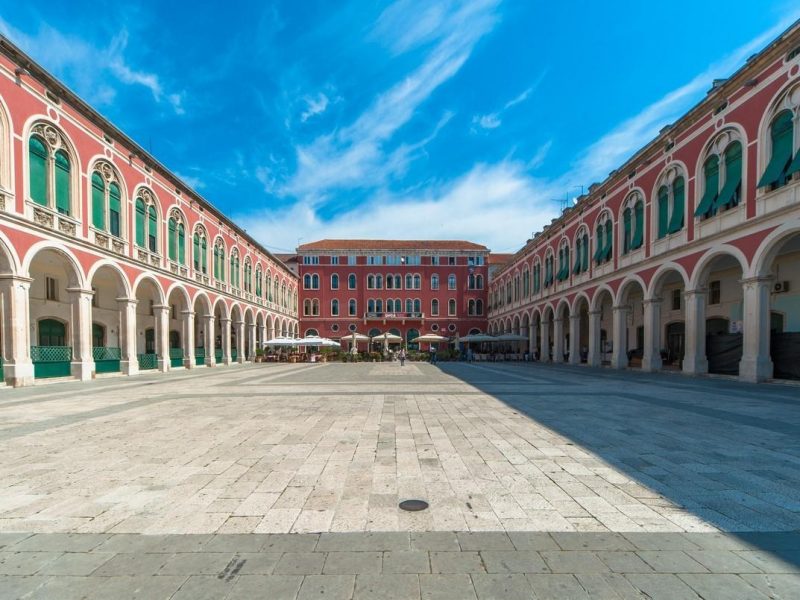
- Pjaca or People’s Square is located right in front of the Palace and its Iron Gate. It is enclosed by beautifully preserved Renaissance palaces of Split’s nobility, the Romanesque bell tower, the house of the Nakić family in its distinctive Art Nouveau style. If you are looking for a place to rest or grab a bite after sightseeing the old town, choose one of the numerous small cafes, restaurants and bars. The Old Town Hall, where the city’s affairs were once handled, now houses an exhibition center.
- Prokurative or Republic’s Square, lies west of the Riva and Palace and is certainly one of Split Attractions. It was built in the mid-19th century by one of the most notable mayors of Split, Antonio Bajamonti, who wished to achieve the look of Venice’s Procuratie with its arcades, horseshoe shape and neo-Renaissance buildings. In the summer months it becomes the stage for concerts, plays and festivals.
- Voćni Trg (Fruits Square) or officially the Brother Radić Square is a small, but charming square right behind the Riva promenade. Its name derives from the farmers that used to sell their fruits here. The square is dominated by the octagonal defensive Venetian tower from 15th century, the 17th century Milesi Palace with its beautiful Baroque façade and the statue of poet and humanist Marko Marulić, the father of Croatian Renaissance and a notable citizen of Split. The monument was created by the outstanding and world-famous Croatian artist, sculptor Ivan Meštrović.
#4
Buy Organic Food on Local Markets

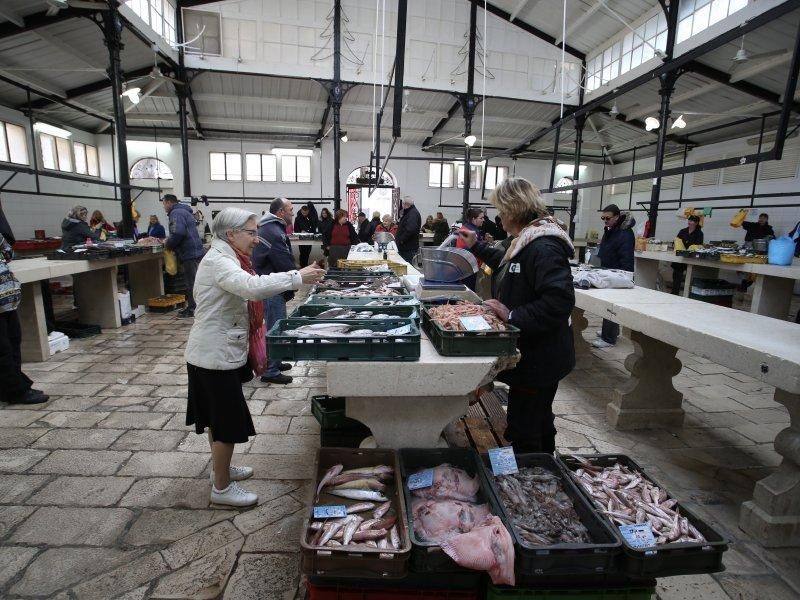
- Peškarija is the main fish market located on Marmontova Street. Despite the increasing number of large supermarkets, this is still the only place where locals buy their fish. It is best visited in early mornings when the fresh catch comes in and sellers loudly encourage passersby to buy. Yes, it is noisy, vibrant and slippery, but nevertheless it is an obligatory Split Attraction and a thing to do in Split Croatia. Even if you have no intention of buying, stop by, inhale the special atmosphere and see what the Mediterranean Sea has to offer.
- Pazar or the Green Market lies next to the eastern wall of Diocletian’s Palace and is popular with locals and tourists. From vegetables and fruits deriving from the fields in Split’s surrounding area to homemade cheese, organic eggs, meat and flowers, here is everything you need for preparing a delicious dish. Look for those old ladies that sell only one or two not perfectly looking products and you can be sure that these fruits or vegetables are local and actually grew in the lady’s backyard. Right next to the food stands is a row of stands that sell fake soccer dresses, sunglasses, purses, etc. but also some souvenirs like lavender. If you like to bargain, this might be the spot for you!
#5
Explore the Old Town – Varos

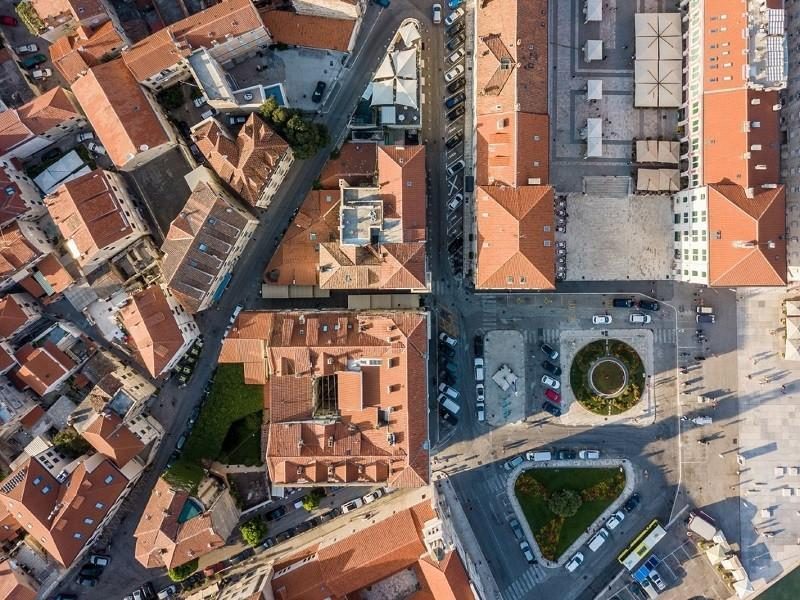
Veli Varoš or simply just Varoš developed in the 16th century and is one of the oldest neighborhoods in Split, located on the eastern slopes of Marjan Hill. Its small narrow alleys, old stone houses and virtually no traffic will take you back into the times, when it was populated by hardworking fishermen and farmers. Their modest houses, densely lined up along the winding roads, still bear testimony to the hard life of their residents. There are several mostly mediaeval churches worth seeing, particularly St. Nicholas Church (Sv. Mikula) from the 11th century, which is an exceptional and beautiful example of pre-Romanesque sacral architecture. Varoš is not a place that must be seen but rather experienced. Let it win you over with its peacefulness and calmness, just a few steps away of buzzing Riva and Marmontova Street.
Thanks to the recently awakened consciousness of local authorities, modern and contemporary reconstructions have been banned in this area with the aim to preserve the authentic look of Varoš. Split’s conservation department keeps a vigilant eye on this matter, knowing that more will be lost than gained if modern windows, shutters, A/C devices etc. take over the area. Nevertheless, the beautifully restored houses do provide all amenities of modern living (just hidden from the eyes of the observer) and are a great place if you are looking for accommodation in Split. Even if you are staying somewhere else, a walk through this labyrinth of streets is a must among the things to do in the city!
#6
Wonder Around The Marjan Hill

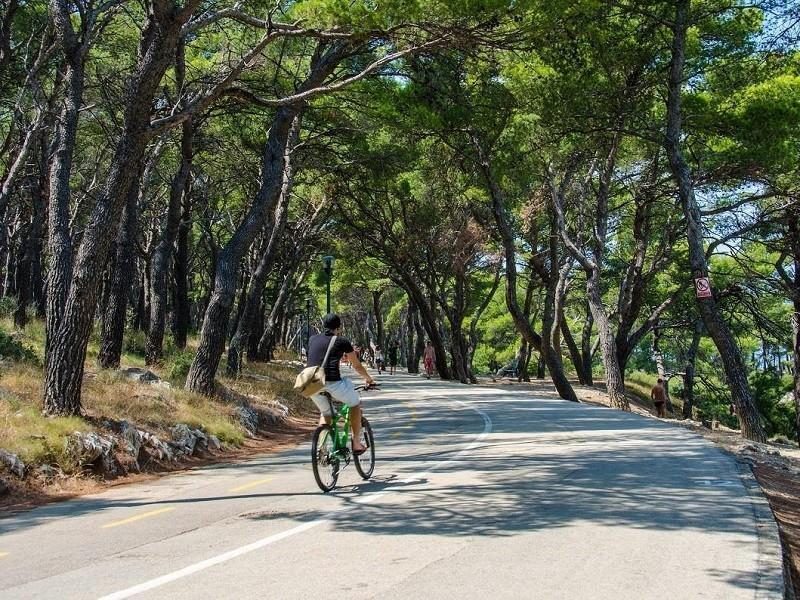
Marjan hill, which rises above Split, is the city’s landmark and a great spot if you wish to escape the heat in the summer. Due to its location within the city, the forest covered hill is a very popular recreational zone of its residents and also an excellent place for those who like any type of outdoor activity (biking, walking, jogging, free climbing etc.). The 178 m tall hill offers not only beautiful nature, but is also rich in culture as there are several old churches, the old Jewish cemetery and famous Gallery Meštrović on the southern side. Between all Split attractions this one offer the most spectacular view from several vista points and, on a clear day, one has a splendid panorama over the city, sea and islands.
Marjan hill is encompassed by the sea so you can easily enjoy refreshment in the clear crystal blue water at a public beach, cliffs, secluded coves or nude beaches, which are all within walking distance.
#7
Visit the Numerous Museums

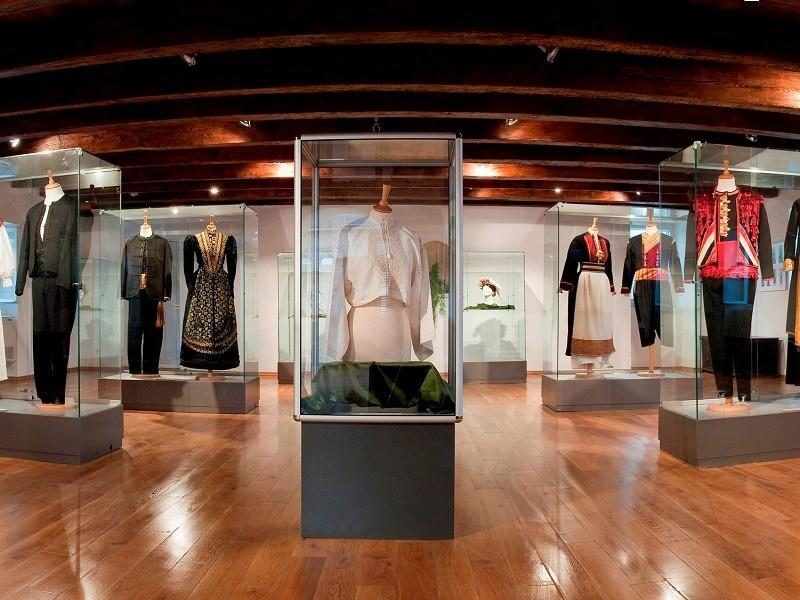
Gallery Meštrović is another important site among all Split Attractions. This majestic building houses the most significant works of Croatia’s most eminent sculptor Ivan Meštrović, who is famous beyond national borders. Even those who are not art enthusiasts will love this place as it offers stunning views from the garden over the sea and great architecture. The entry ticket to the Museum covers also the entry to the Kaštelet chapel down the road, which houses a set of wooden wall panels carved by this talented artist.
Archaeological Museum
Established in 1820, it is the oldest museum of Split, where visitors can see artefacts from prehistoric times, the period of Greek colonization until the early Middle Ages. The Roman period is very well represented by many objects from nearby Salona, but also from Narona and the island Vis.
Ethnographic Museum
It is located in Diocletian’s Palace behind the Cathedral and houses objects of traditional Dalmatian culture. Here you will find embroidered dresses, traditional furniture, weapons and other everyday objects that have been used in this region over centuries..
City Museum of Split
The Museum is located in the 16th century palace of noble family Papalić inside the Palace complex and houses exhibits that illustrate local history from prehistoric times to the 20th century. It also gives great insight into the life of nobility at that time as the interior has been kept in its original state.
#8
Watch the Soccer Game at Poljud Stadium

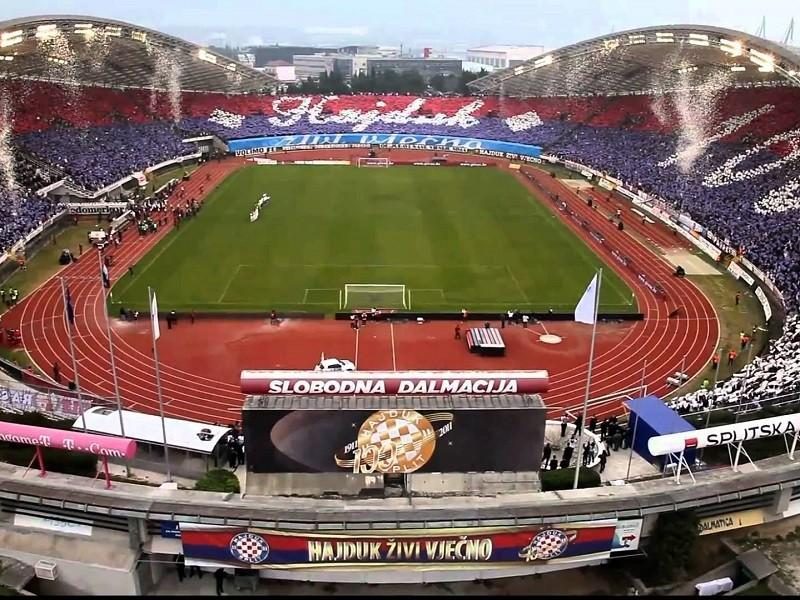
Split and sports have been in a long and loving relationship for decades, even centuries, which produced offspring, the locals are particularly proud of. Football club Hajduk, which was founded in 1911, is certainly the most important one and surely a Split Attraction. Despite its ups and downs over the years, the club is widely loved by the residents and often a subject of heated discussions. Its home is the Poljud stadium that transforms into the stage of the Ultra Music Festival every summer.
Popular and traditional sport clubs are also rowing club Gusar and Yacht Club Labud that organizes every year the largest regatta in this part of the Adriatic Sea called Mrduja. Basketball and its legendary club KK Split (once called Jugoplastika) had its most glorious days in the late 1980s, when their team was named one of the best non-NBA teams ever and their players true masters of European basketball. Some of the most famous players are Toni Kukoč, Dino Rađa and Žan Tabak, who successfully continued their careers in the NBA.
Split’s west coast bears witness of the great sporting achievements of the city’s sons and daughters with a unique walk of fame. During its reconstruction in 2013, bronze plates with names of all Olympic medalists from Split were embedded into the waterfront promenade to pay tribute to the athletes, who promoted their city and sport well beyond its borders.
Besides the above mentioned Basketball players, you will find also Blanka Vlašić, Ivano Balić, the Skelin Brothers and Wimbledon winner Goran Ivanišević, just to name a few. For the true sport enthusiasts one of the things to do in Split may also be to visit the Museum of Sport and its Hall of Fame.
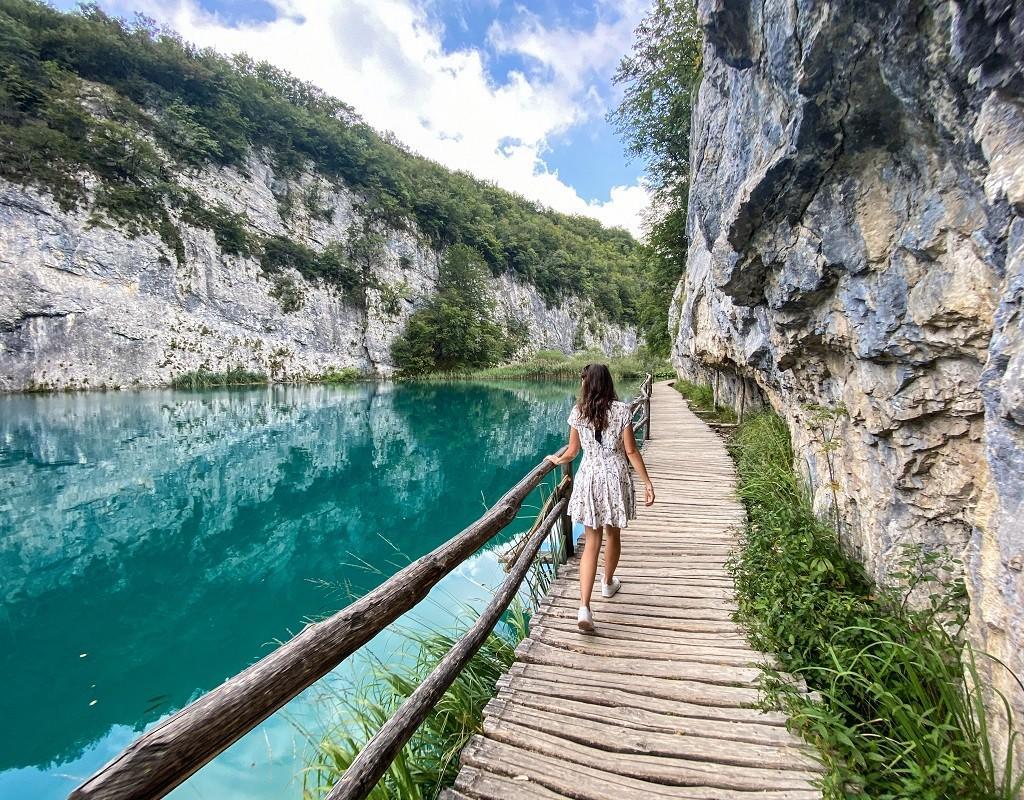
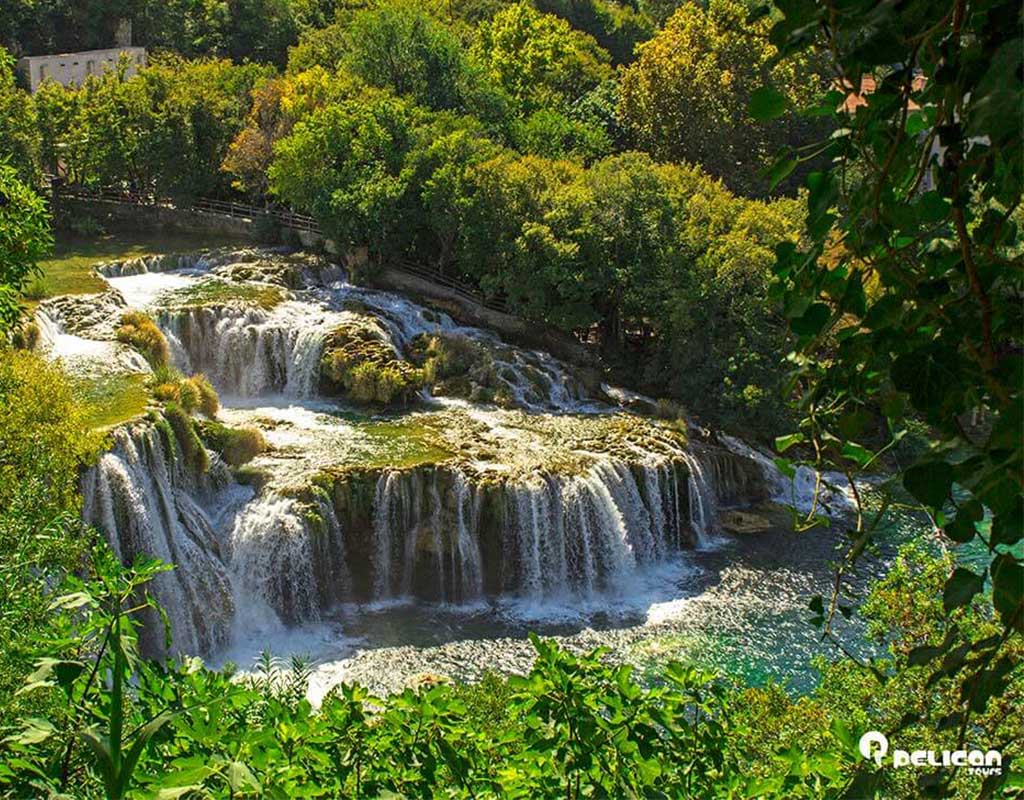
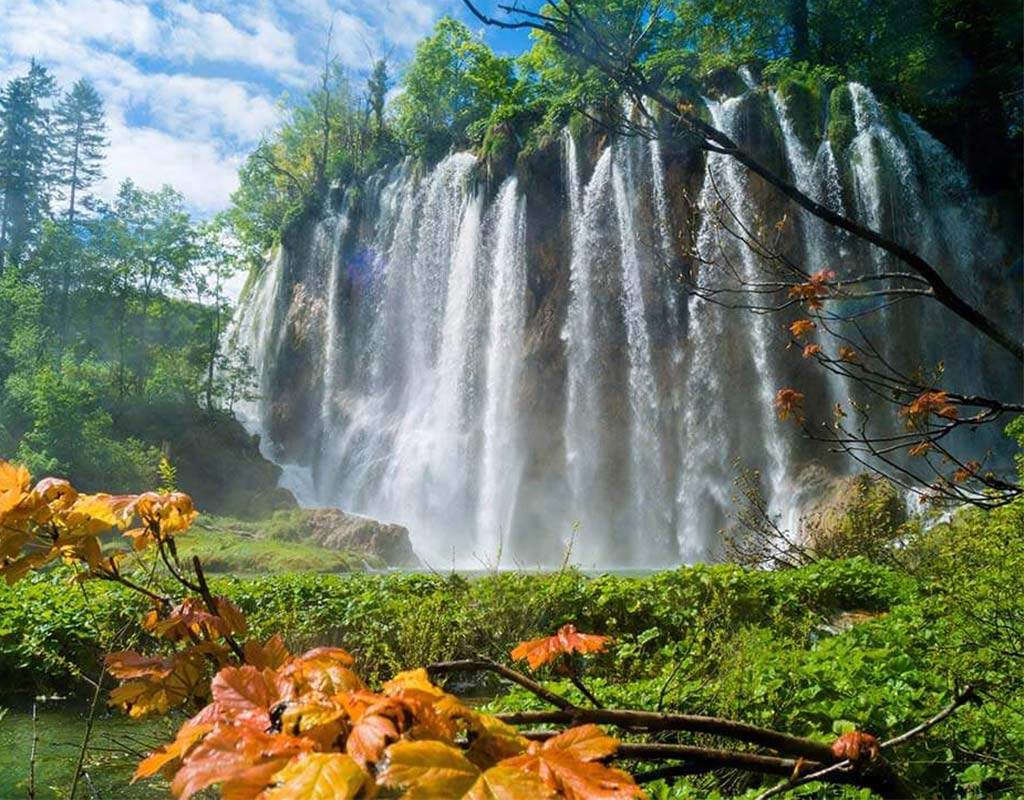
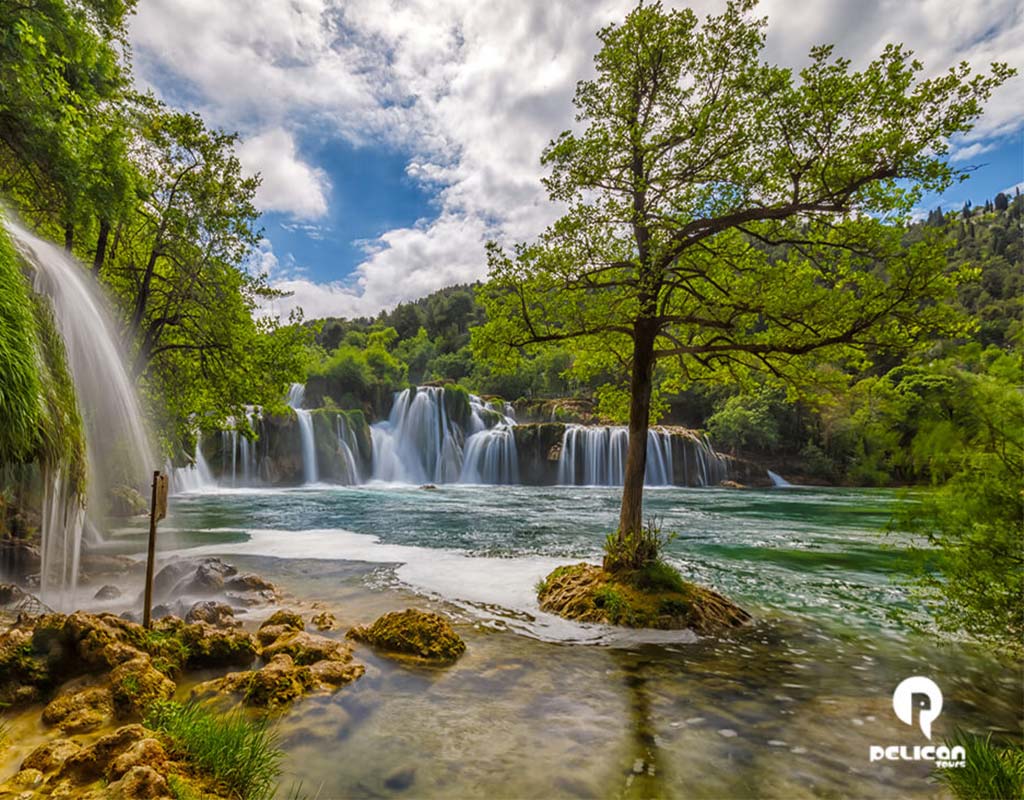
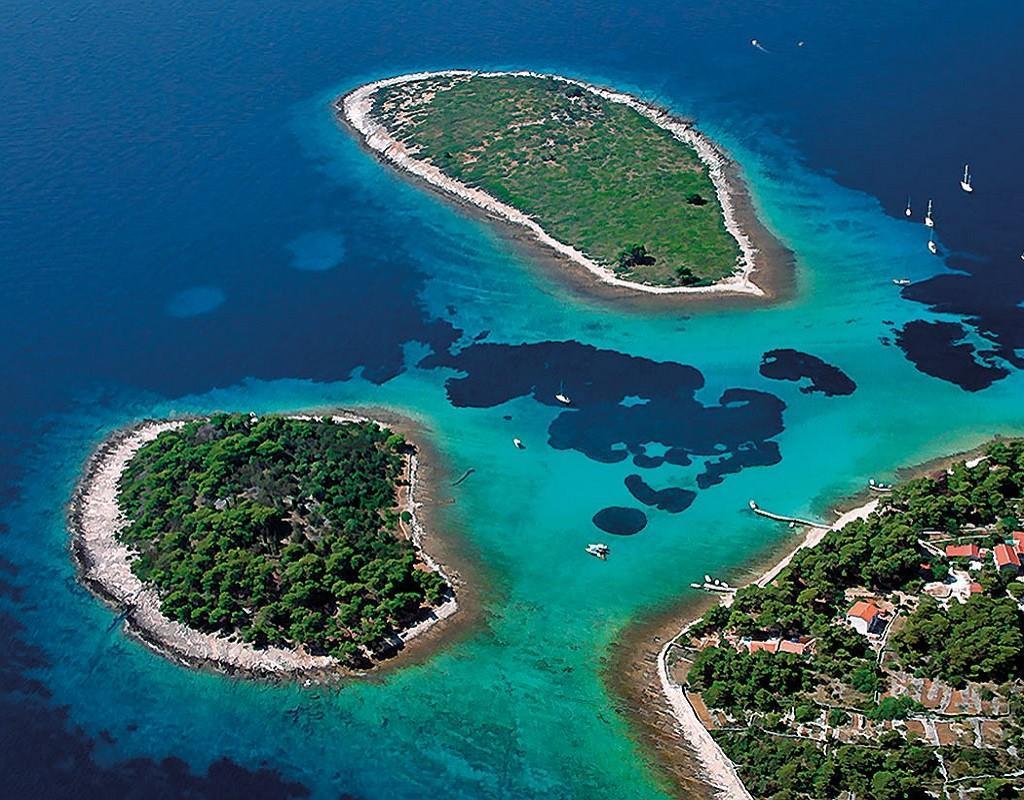
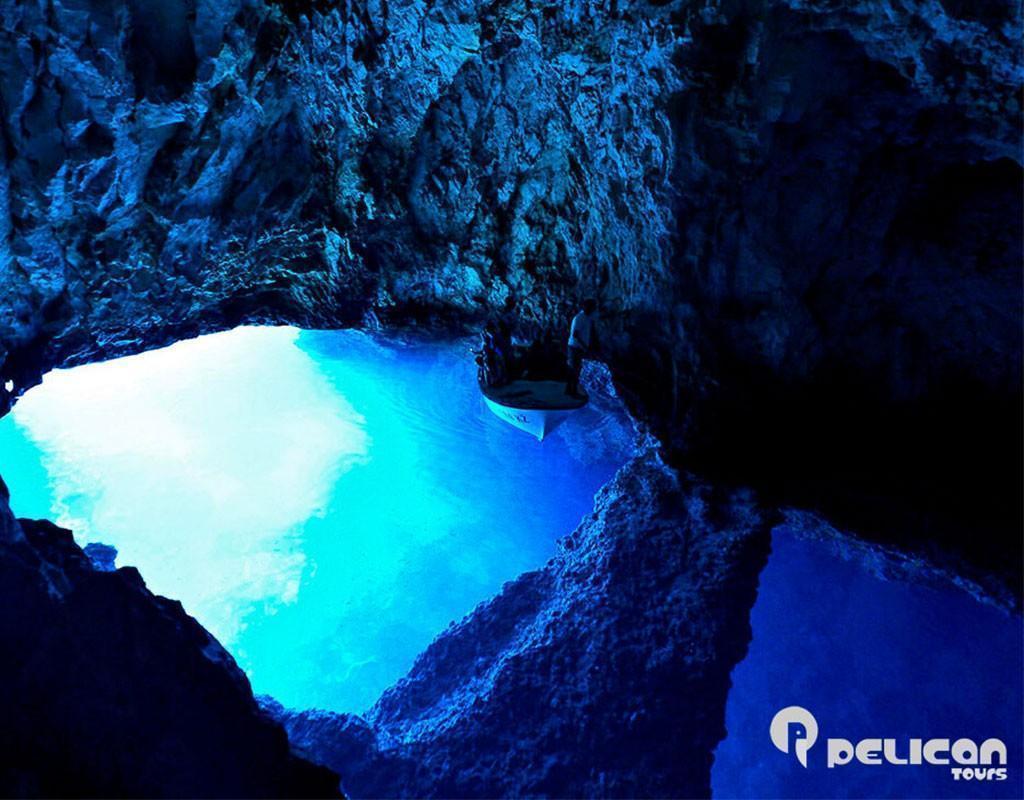
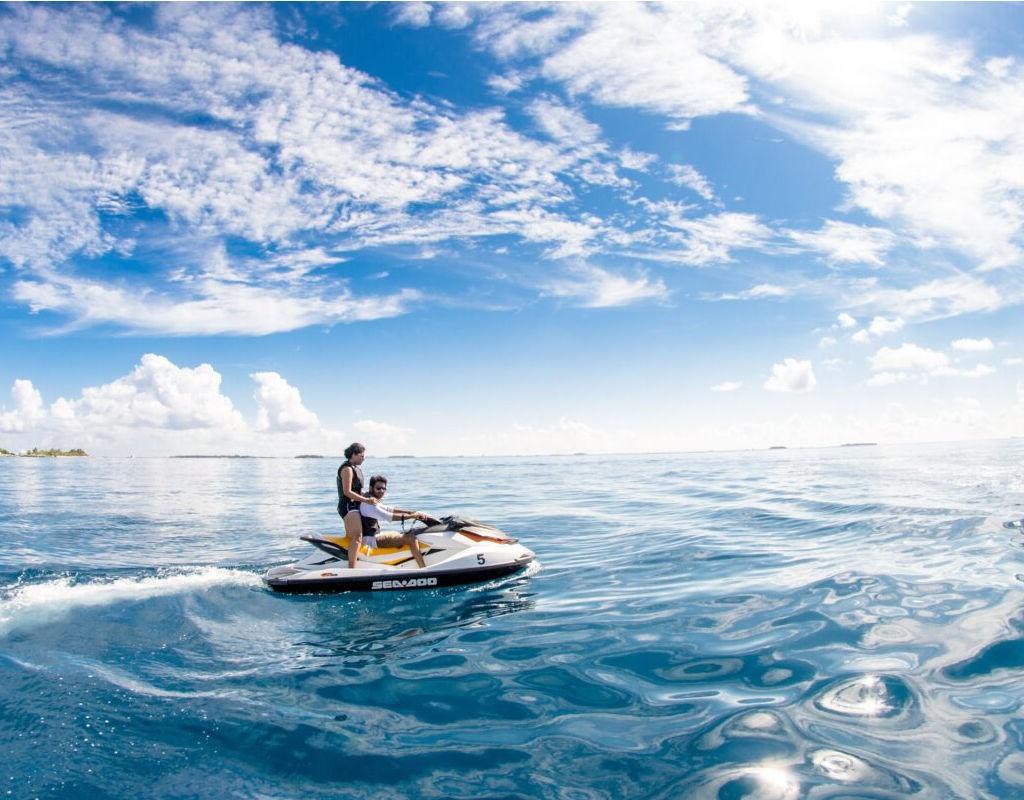
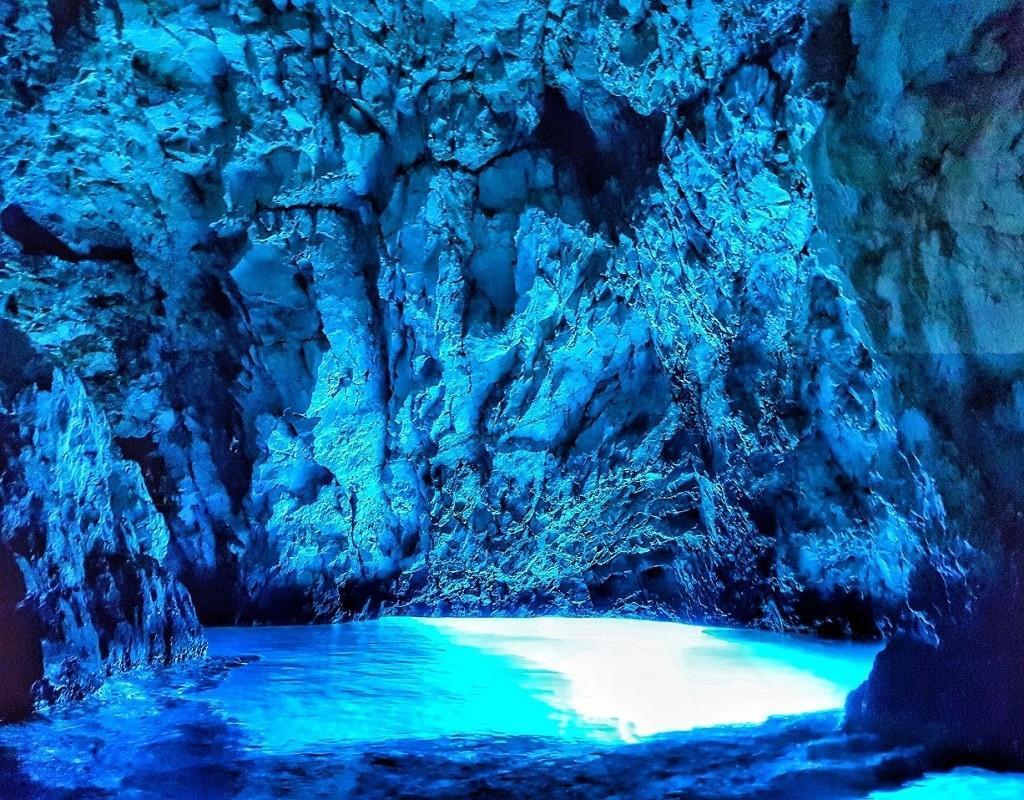
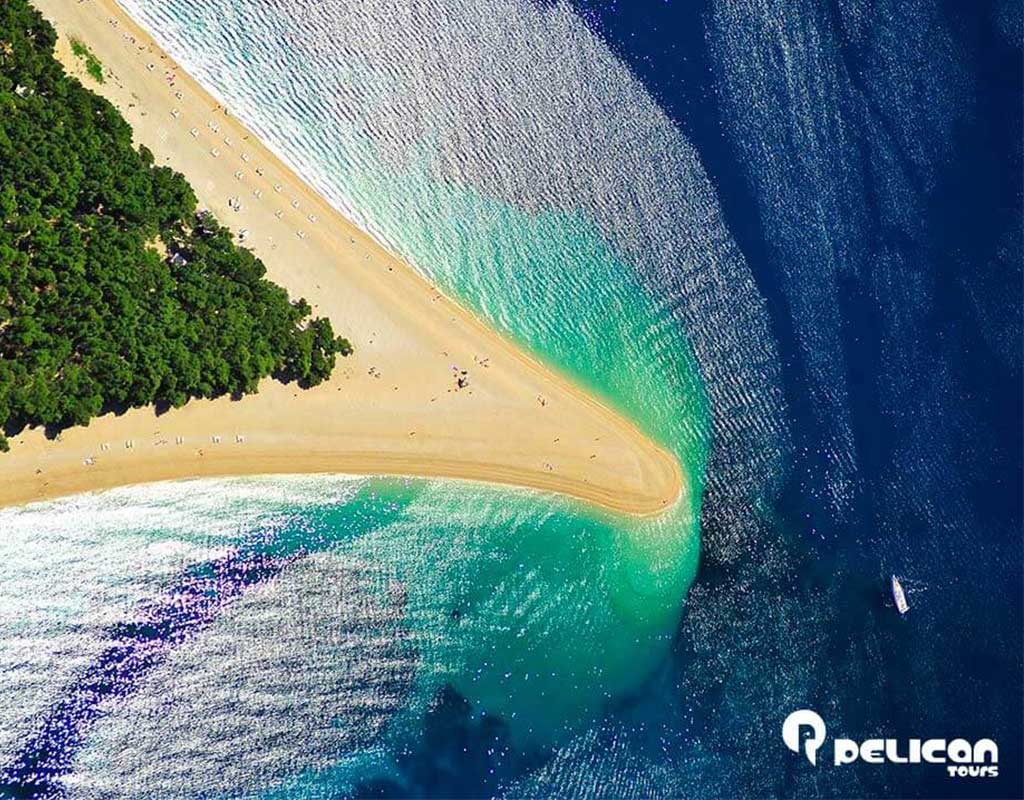
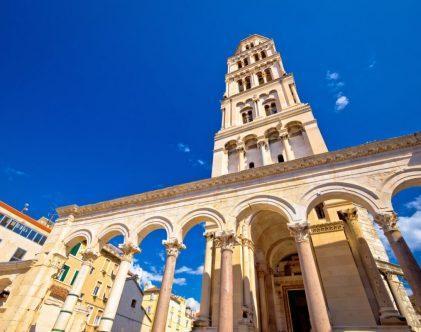

 No products in the cart.
No products in the cart.